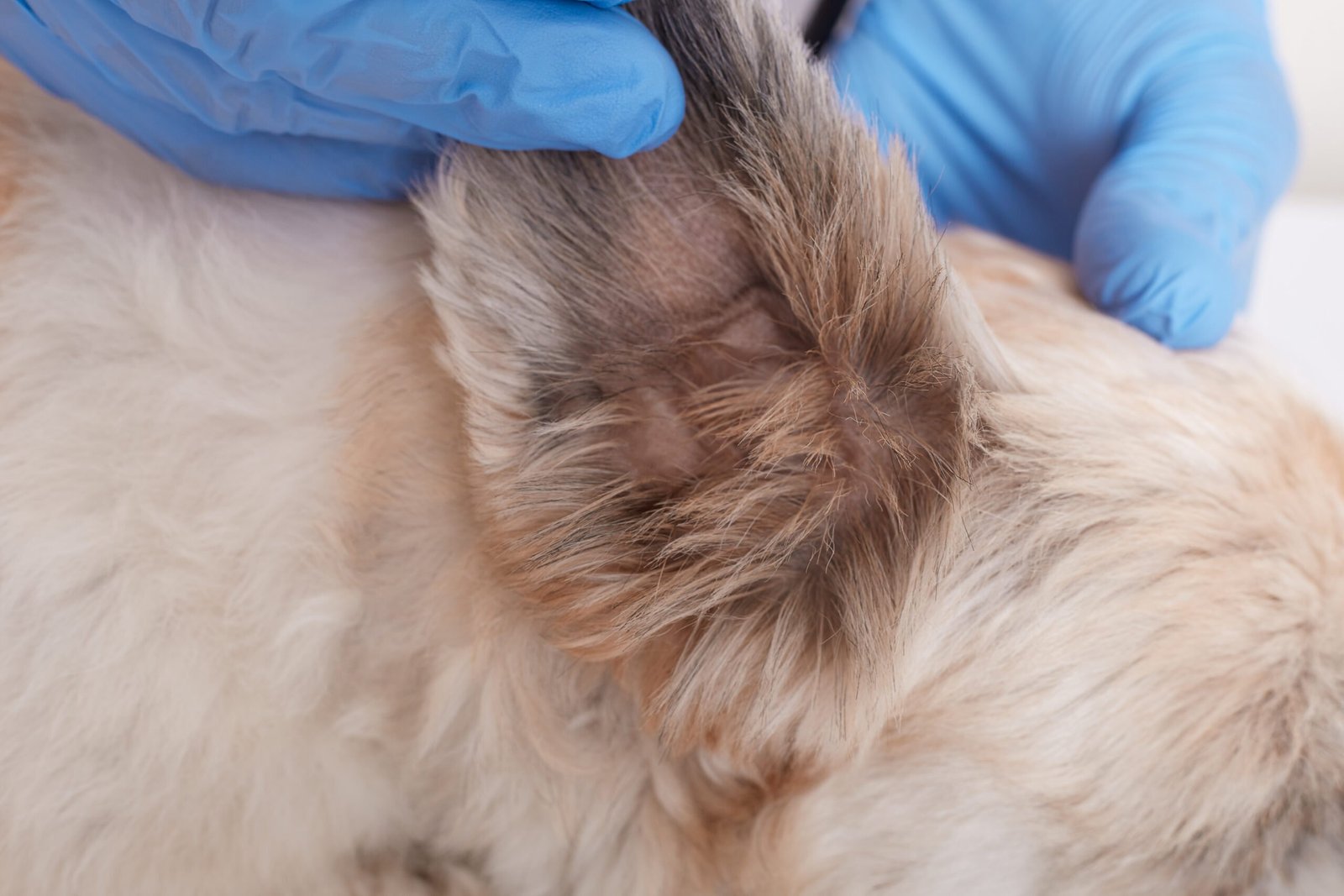Fleas and ticks are common parasites that can affect dogs of all ages.
In this article you will learn the answer of the question: how can fleas and ticks affect your dog?

HOW TO TREAT AND MANAGE WHEN FLEAS & TICKS AFFECT MY DOG
They cause a variety of health problems
- Flea allergy dermatitis (FAD): This is a skin condition that occurs when a dog is allergic to flea saliva. Symptoms can include itching, hair loss, and skin infections.
- Anemia: Fleas can suck a lot of blood from a dog, which can lead to anemia. This is a condition where the dog’s body does not have enough red blood cells to carry oxygen.
- Tapeworms: Fleas can carry tapeworms, which are parasites that can live in a dog’s intestines. Symptoms of tapeworms can include weight loss, diarrhea, and vomiting.
- Lyme disease: Ticks can transmit Lyme disease, a serious bacterial infection that can affect the joints, heart, and nervous system.
- Rocky Mountain spotted fever: Ticks can also transmit Rocky Mountain spotted fever, a serious bacterial infection that can cause fever, headache, and rash.
We always encourage to consult with your vet before doing anything!
How can fleas & ticks affect my dog and how to protect him
The best way to protect your dog from fleas and ticks is to use a year-round flea and tick prevention medication. There are a variety of different medications available, so talk to your veterinarian to find the best one for your dog.
Tips to prevent fleas and ticks on your dog
- Keeping your dog’s yard clean and free of brush and debris.
- Bathing your dog regularly.
- Using a flea and tick collar or shampoo.
- Check the fur for fleas and ticks regularly.
If you think your dog has fleas or ticks, take them to the veterinarian immediately. They can prescribe medication to kill the parasites and prevent the spread of disease.
Additional tips to prevent fleas & ticks affect your dog
- Keep your dog indoors as much as possible during the warmer months, when fleas and ticks are most active.
- If your dog does go outside, make sure they wear a flea and tick collar or a topical medication.
- Check your dog for fleas and ticks every day, especially after they have been outdoors.
- If you find a flea or tick on your dog, remove it immediately with a flea comb or tweezers.
- Wash your dog’s bedding and any other items they have come into contact with in hot, soapy water.

DOG PARASITES
Internal Dog Parasites
Internal dog parasites are worms or protozoa that live in the dog’s digestive system, blood, or tissues. They can be transmitted by ingestion of contaminated food or water, contact with infected feces or soil, bites from infected insects or animals, or transplacental or transmammary transmission from mother to offspring.
Types, Symptoms, and Treatment
Dogs are wonderful companions that can bring joy and happiness to our lives. But they can also get infected by various parasites that can affect their health and well-being. Parasites are such as the above mentioned are organisms that live on or in a host organism and get their food at the expense of their host. Parasites can be internal or external, depending on where they live in the dog’s body.
Internal parasites live inside the dog’s organs or tissues, while external parasites live on the dog’s skin or fur. Parasites can cause a range of problems for dogs, from mild irritation and discomfort to serious diseases and complications.
Some parasites can also be transmitted to humans and other animals, posing a risk to public health. Therefore, it is important for dog owners to recognize the signs and symptoms of common dog parasites and seek veterinary help as soon as possible. In this article, we will cover some of the most common dog parasites, their causes, their treatments, and how to prevent them.

MOST COMMON INTERNAL DOG PARASITES
Heartworms in Dogs
Heartworms are long, thin worms that live in the heart, lungs, and blood vessels of infected dogs. They are transmitted by the bite of an infected mosquito. Heartworms can cause heart failure, lung damage, organ failure, and death if left untreated. Symptoms of heartworm infection include coughing, difficulty breathing, fatigue, weight loss, and fainting.
Heartworm infection can be diagnosed by a blood test and treated by injections of drugs that kill the adult worms. Prevention is the best option for heartworm infection, as treatment is expensive and risky. There are several effective products that can prevent heartworm infection in dogs, such as monthly chewables, topical treatments, or annual injections.
Roundworms in Dogs
Roundworms are spaghetti-like worms that live in the intestines of infected dogs. They are transmitted by ingestion of eggs from infected feces or soil, or by transplacental or transmammary transmission from mother to offspring. Roundworms can cause diarrhea, vomiting, weight loss, pot-bellied appearance, poor growth, and intestinal obstruction in dogs.
They can also infect humans and cause eye damage or organ damage if the larvae migrate to different parts of the body. Symptoms of roundworm infection include visible worms or segments in the feces or vomit.
Roundworm infection can be diagnosed by a fecal exam and treated by oral medications that kill the worms. Prevention is the best option for roundworm infection, as it can pose a serious threat to human health. There are several effective products that can prevent roundworm infection in dogs, such as monthly chewables or topical treatments.
Hookworms in Dogs
Hookworms are small, hook-shaped worms that live in the intestines of infected dogs. They are transmitted by ingestion of larvae from infected feces or soil, penetration of larvae through the skin, or by transmammary transmission from mother to offspring. Hookworms can cause anemia, diarrhea, weight loss, weakness, and death in dogs.
They can also infect humans and cause skin lesions or intestinal problems if the larvae penetrate the skin or are ingested. Symptoms of hookworm infection include pale gums, dark or bloody stools, poor appetite, and lethargy.
Hookworm infection can be diagnosed by a fecal exam and treated by oral medications that kill the worms. Prevention is the best option for hookworm infection, as it can pose a serious threat to human health. There are several effective products that can prevent hookworm infection in dogs, such as monthly chewables or topical treatments.
Tapeworms
Tapeworms are flat, segmented worms that live in the intestines of infected dogs. They are transmitted by ingestion of fleas or rodents that carry tapeworm eggs or larvae. Tapeworms can cause weight loss, diarrhea, anal irritation, scooting behavior and many other discomfort for your furry friend.
By following these tips, you can help to protect your dog from the harmful effects of fleas and ticks.
We recommend to jump at pet md article and continue reading on the topic!
🐾









